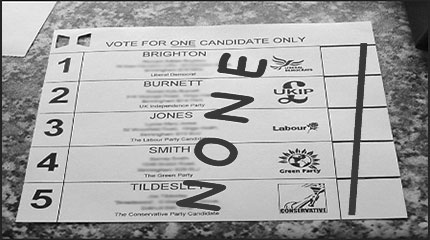For most of my life I have voted for a political party that I had a measure of belief in. It was not a mainstream party so, because of ‘first-past-the-post’, it always felt like a wasted vote. Twice, when the consequences appeared to be too great, I was tempted to vote tactically to keep another party out, which worked, but felt like cheating.
At the 2015 election I dutifully cast my vote, but with misgivings – by that time I felt thoroughly jaded by the behaviour of our politicians and our electoral system. Much as I dislike UKIP it seemed appalling that they could take such a significant part of the vote and end up with so few seats. That said, the whole concept of seats now seems redundant to me.
Firstly, I believe we have a responsibility to engage with our culture, our shared lives, our community, our governing and law-making. Part of that, at the minute, means voting – it is one of the few tools we have, however inadequate. How many of us vote for things we don’t really believe in, or don’t even understand? Rather a lot I suspect.
Secondly, I believe that striving for honesty is always useful, if not always easy to achieve.
Combining both of those beliefs means on June 8th I will go to the voting booth and draw a clear line through all the candidates and write ‘None’ as per the suggestion on this website, which I found very encouraging.

The time for party politics and representation is over, and I can’t continue condoning a political system which I have no faith in whatsoever. So what would I like to see in its place?
Sortition is the answer …
It’s time to stop giving power to people who are seeking it. We need to select our government from the general populace as was done in Ancient Greece. From Wikipedia:
“In governance, sortition (also known as allotment or demarchy) selects political officials as a random sample from a larger pool of candidates.[1] The logic behind the sortition process originates from the idea that “power corrupts.” For that reason, when the time came to choose individuals to be assigned to empowering positions, the ancient Athenians often resorted to choosing by lot. In ancient Athenian democracy, sortition was therefore the traditional and primary method for appointing political officials, and its use was regarded as a principal characteristic of true democracy”
Doing something similar to this would mean an end to career politicians. The removal of party politics would mean that a government could work together at finding solutions rather than wasting time and energy on political point-scoring and needlessly pulling down of one another’s ideas – in how many other spheres of work would we put up with the behaviours and manners that we see in the House of Commons?
One very rough model …
From this simplistic starting point I believe many working models could be developed and evolved. I quite like the idea of a government drawn at random from eligible 20 – 35 year olds, who are offered the chance to serve for up to three years. Intakes could be staggered so there is always a change of personnel, with longer-standing members mentoring the newcomers.
Of course, this flexi-government would be supported by a stable civil service and bank of experts in all fields, to be drawn upon as required.
For larger decisions, the entire eligible population would be able to vote in online referendums. In that instance the government’s role would be to ensure that potential voters can access all the relevant information to make a sound decision (unlike our disastrous 2016 referendum, where hard facts seemed very hard to come by).
If it ever came to it, then I’m absolutely certain exact details could be hammered out, but would it work? I don’t know, of course. If we switched over tomorrow, then probably not, but if we knew right from a young age that we might be called upon at some point to help run the country, and had some preparation for that in our school years then I really do think it could. And with careful thought I think a transition from the current form to the new one could also work.
A whole load of corporate corruption could be swept out of the window, and the rest of us could no longer just cast our vote, shirk any further responsibility, and moan about the buggers until the next time!